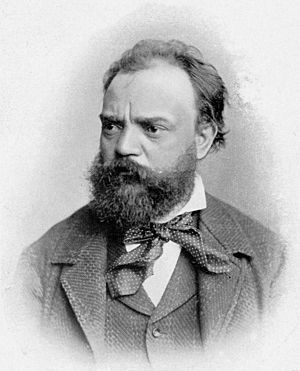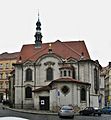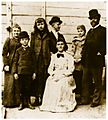Antonín Dvořák facts for kids
Antonín Dvořák (born September 8, 1841; died May 1, 1904) was a famous Czech composer. He was born in Nelahozeves, near Kralupy, and passed away in Prague.
Dvořák is known as one of the most important Czech composers. He wrote many different types of music. These include chamber music, piano pieces, songs, operas, and nine symphonies. His most famous work is the New World Symphony. He wrote this symphony while he was in the United States. The slow part of this symphony, with its beautiful solo on the cor anglais, is very well-known.
Contents
Life of Antonín Dvořák
Early Life and Music Training
Antonín Dvořák was born in a small village near Prague. At that time, Prague was part of the Austrian Empire. His father worked as a butcher and also ran an inn. His father played the zither and composed simple dances.
Young Antonín started learning the violin from his village schoolmaster. Soon, he was playing the violin at his father’s inn. He also played in local churches and the village band. Just before his 12th birthday, he began learning to be a butcher. A year later, he went to school in Zlonice. There, he learned a lot about music and also the German language.
His teacher convinced Dvořák's parents that he should become a musician. So, they sent him to study music in Prague at the Organ School. He continued to learn German. He became a good viola player. He played in concerts and in the Estates Theatre. He often played there when large orchestras were needed for operas by Wagner.
Starting His Music Career
After finishing his studies, Dvořák's first job was playing in a band. They performed in restaurants and at dances. This was a time when people in Bohemia became very interested in their own national culture. Plays and operas were allowed to be performed in the Czech language.
The band Dvořák played with later joined the Bohemian Provisional Theater Orchestra. From 1866, Bedřich Smetana was the conductor of this orchestra. Dvořák was the main viola player. He also taught music to earn extra money. During this time, he started to compose his own music.
In 1871, Dvořák left the orchestra to focus more on composing. For several years, he still had to teach to make enough money. He wrote a cantata called The Heirs of the White Mountain, which was very successful. In 1874, he wrote an opera called King and Charcoal Burner. However, the opera house did not want to perform it. This made Dvořák realize he needed to be more critical of his own work. He destroyed many of his compositions that he felt were not his best. He decided he should not compose like Wagner. Instead, he wanted to find his own unique style.
In 1873, Dvořák got married. He also got a job as a church organist. His Third Symphony was performed at a concert conducted by Smetana. Dvořák rewrote his opera King and Charcoal Burner with completely new music. It was performed in 1874. He continued to compose a lot more music.
Gaining International Fame
In 1877, Dvořák received a letter from Eduard Hanslick. It said that he had won a prize. The great composer Johannes Brahms was also interested in his music. Dvořák's music then started to be published by Simrock, a famous German music publisher. His music was performed in many countries, even as far away as New York. His fame grew quickly. Even his operas were performed abroad. His opera Dimitrij was especially popular. Brahms became a great friend and helped him a lot. Brahms and Hanslick tried to convince him to move to Vienna. Vienna was a major music city. However, Dvořák wanted to stay in his home country.
Dvořák's Slavonic Dances were published in 1878. They have always been very popular. The conductor Hans Richter conducted the Slavonic Rhapsody No. 3 in Vienna. His Stabat Mater (1880) was performed abroad. Dvořák was invited to visit England in 1884. He became very popular in England and visited many times. English choirs enjoyed singing his choral works. His Requiem Mass was first performed in Birmingham at the Triennial Music Festival. He also received an honorary degree from Cambridge University. In 1890, Tchaikovsky invited him to Russia.
Time in America (1892–1895)
From 1892 to 1895, Dvořák worked as the director of the National Conservatory of Music in New York City. He earned a lot of money, $15,000 a year. Dvořák was very interested in the music of black Americans. He met a student named Harry T. Burleigh. Burleigh was one of the first African-American composers. He introduced Dvořák to traditional American Spirituals.
In 1893, while in New York, Dvořák wrote his most famous work. This was the Symphony No.9, "From the New World". He spent the summer of 1893 with his family in Spillville, Iowa. This was a Czech-speaking community where some of his cousins lived. There, he also composed chamber music. This included a String Quartet in F, known as the “American” quartet. He also wrote a Sonatina for Violin and Piano.
In 1895, Dvořák wrote his Cello Concerto in B minor. This piece became one of his most popular works. However, he wanted to return to his own country. He was also not being paid his full salary. He heard that he had been made an honorary member of the Gesellschaft der Musikfreunde in Vienna. He decided to go back to Bohemia. He continued his job as a professor of composition at the Prague Conservatory.
Dvořák's Last Years
During his final years, Dvořák spent most of his time writing operas. His opera Rusalka is especially popular. It features a famous aria for soprano called To the Moon. The opera is a fairy-tale. Its story is based on Hans Anderson’s story of the Little Mermaid. In 1896, he visited London for the last time. He went to hear the first performance of his Cello Concerto. In 1897, his daughter married his student, the composer Josef Suk.
Antonín Dvořák died in 1904 after a short illness.
Dvořák's Music Style
Dvořák wrote many different kinds of music. His style was based on classical forms, like those used by Beethoven. However, his music also showed the influence of Czech folksong. He lived at a time when nationalistic feelings were very strong among the Czech people.
Smetana wrote music that was very Czech in character. Dvořák learned from Smetana’s music. But he never copied Smetana's style. Only five of Dvořák's nine symphonies were known during his lifetime. The other four were discovered and published in the 1960s. Because of this, all his symphonies were renumbered.
The last three symphonies, numbers 7, 8, and 9, are performed most often. The Ninth Symphony, From the New World, is one of the most popular symphonies ever written. His two sets of Slavonic Dances are also extremely well-known. They are often played as a piano duet. Dvořák also wrote concertos for the violin, cello, and piano. He composed many operas, with Rusalka being the most famous. He also wrote chamber music, songs, choral music, and piano music.
Books about Dvořák
- Slavonic rhapsody: The life of Antonín Dvořák, by Barthold Fles
Images for kids
-
Dvořák statue in Stuyvesant Square in Manhattan by Ivan Meštrović
-
Dvořák statue in Prague
-
Portrait of Dvořák's son-in-law Josef Suk, with dedication: "Drahé miss Otilce Dvořákové" ("To dear miss Otilka Dvořáková"), 1894
See also
 In Spanish: Antonín Dvořák para niños
In Spanish: Antonín Dvořák para niños













